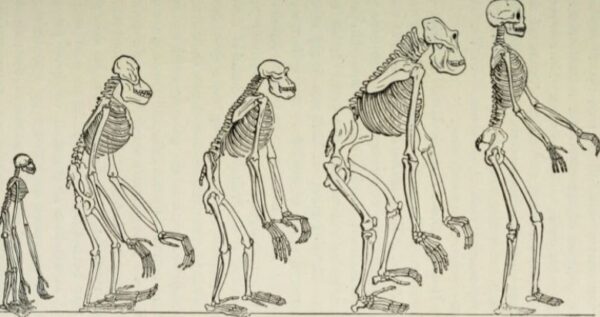I can’t wait to tell you that today I got a new perspective to the way I look at the word ‘anthropology’. From years, I believed, ‘anthropologists’ study humans and human societies. So I believed, them to be working closely with the archeologists, making theories on the evolution of mankind and writing articles on how society developed, how we started adapting to agriculture and eventually settling down instead of being ‘hunters and gatherers.’ To my intense surprise, I saw a course on ‘business anthropology’ added to our curriculum and somehow I could not relate to how and why we should study anthropology? What applications can we expect out of it in helping with our role as future HR managers? ‘Why study the past?’
For years, whenever I thought of anthropology, the first image that came into my mind was something like this:

As a future HR manager, I have to agree that learning should be open, genuine and its unexplored form. To know the depths of a concept, I have to shed my preconceived notions. I started analyzing the way humans evolved from being primates to Homo sapiens today, businesses too have evolved. They have also focused on culture as we are. I immediately did some reading on modern anthropology, which showed me how businesses are dependent on anthropologists to make strategic decisions for them. I read an article in Business Insider, which stated that Google has hired anthropologists to study the meaning of the word ‘mobile’. Intel has hired ‘cultural anthropologists’ to study how people outside US are living their lives.
I also realized that technology is itself anthropology. Launching ‘Zoom app’ was an anthropological bet. It was a change and a paradigm shift from the fact of in-person meetings and that change eventually got incorporated as a new ‘culture’. It had promoted the culture of working from a remote environment. Today, I take my classes through ‘Zoom’ and that is a part and parcel of my learning ‘culture.’
Now, this makes me wonder, ‘what is culture?’ We were surprised by the way our discussion unfolded many facets of culture. I am born as a Bengali so that integrates me to the Bengali culture; however, I am a student of NMIMS and through my orientation I was introduced to the NMIMS culture. Culture for me is an interaction between different individuals. It is both an idea and an abstraction. It is also a concept of belongingness.
“Is difference grounds for violence or dominance or celebration?” – This brings us to think about colonialism and the recent outrage of ‘Black Lives Matter’. That makes me connect with the most misinterpreted ‘Survival of the fittest’ theory of Charles Darwin. How some cultures considered themselves to be superior to the rest and resorted to atrocities against people from different culture?
I looked up for the anthropologist, Bronislaw Malinowski whose contribution on ethnography and social theory was of high influence in the field of anthropology. I was surprised to read that his diary, ‘A Diary in the Strict Sense of the term’ was criticized by other anthropologists as ‘revealing, egocentric and obsessional document.’ Though I have not read his actual work, going through the material over internet, I can safely say that the biggest quality of being an anthropologist is to give an honest opinion. It was his personal diary, a way of self analysis and was not intended to be published. Similarly, as I write my opinion today, I want to be for me, my personal random scribbling and do not intend to hurt anyone’s sentiments or impose my opinions to others.
Tags: anthropology hr human resourceYou might like reading:

Getting more customers by expanding market in India
I remember reading the book by Philip Kotler while pursuing my management degree which explained marketing strategies for market leaders, challengers, followers & niches. The strategies mentioned for market leaders included expanding market share (but this may lead to unnecessary price wars), defending market share and expanding the total market (this is most preferred as it has been observed that when […]

My NMIMS Mumbai CD-PI experience, Avishek Dutta
After preparing for about a month and with a handful no. of calls in my basket, I boarded my flight for Mumbai to attend the scheduled CD-PI. Butterflies were there in my stomach and I felt slightly nervous before the big day. But, a good sleep and a light breakfast made a decent start to an eventful day. Below is […]






























